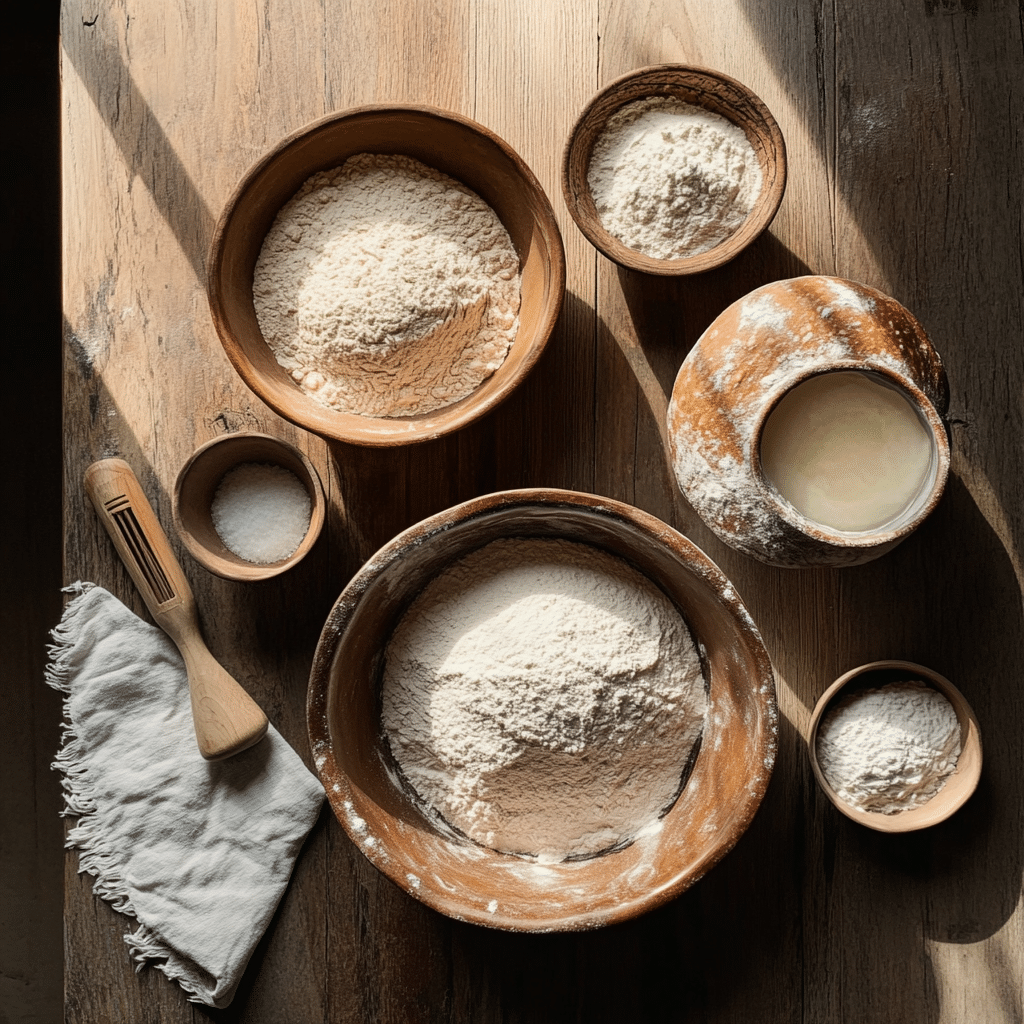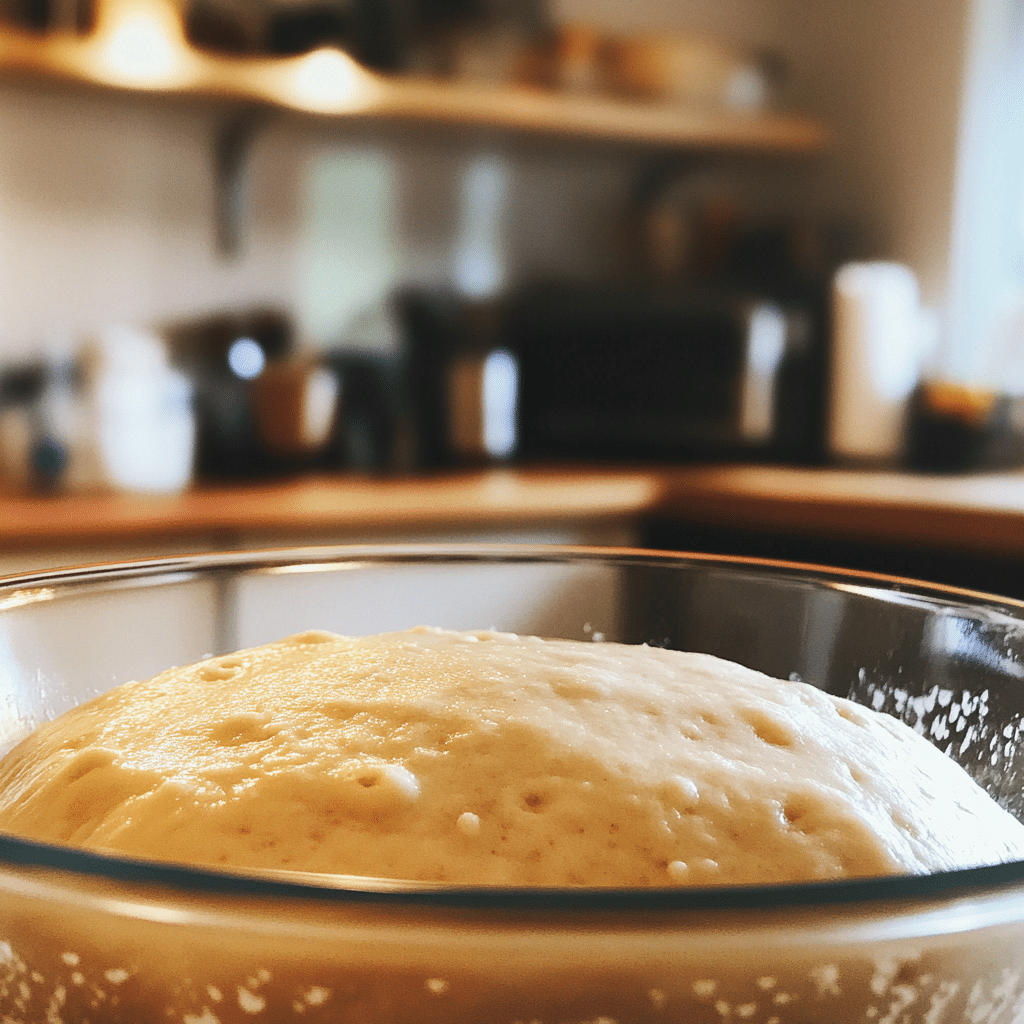Do sourdough bread contain gluten? It’s a question that sparks debate among bakers, nutritionists, and gluten-sensitive eaters alike. With more people avoiding wheat-based products, many assume sourdough is a gluten-free alternative—but is it really? In this article, we explore whether sourdough bread contains gluten, why it may be easier to digest, and how it compares to traditional breads. You’ll also learn what makes sourdough unique, how fermentation impacts gluten structure, and whether it could work for your gut. If you’ve ever wondered, do sourdough bread contain gluten or not, keep reading—because the answer might surprise you.
My Story with Sourdough and Gluten
How My First Boule (and a Breakup) Sparked a Lifelong Obsession
I still remember the first time I asked myself, do sourdough bread contain gluten? I was standing in my tiny Mendocino kitchen, watching my first sourdough boule rise like magic. I made it to impress a date. He disappeared, but my obsession stuck. That moment launched a journey filled with flour-dusted aprons, fermentation journals, and eventually—“Marlene & Crumb,” my coastal bakery and sourdough studio.
Over the years, that one question—do sourdough bread contain gluten—followed me from workshops in Denver to bake-alongs in Brooklyn. The answer? Yes, but not in the same way as regular bread. True sourdough bread contains gluten, but the wild bacteria and yeast in a long fermentation process start breaking it down. That changes how our bodies might react to it.
This doesn’t make sourdough gluten-free—but for many with mild gluten sensitivities, it makes a real difference. I’ve met countless folks who can’t tolerate store-bought bread but feel great after eating a slice of 36-hour fermented sourdough.
It’s not just about what’s in the bread—it’s about how it’s made. And understanding that starts with asking the right question: do sourdough bread contain gluten in a way your body can actually handle?
Print
Do Sourdough Bread Contain Gluten? 5 Powerful Truths You Need to Know
- Total Time: 6 hours 45 minutes
- Yield: 1 loaf 1x
- Diet: Vegetarian
Description
This long-fermented sourdough bread is easier to digest and rich in flavor. Though it contains gluten, extended fermentation helps reduce its intensity, making it a good option for those with mild sensitivities.
Ingredients
500g bread flour (wheat or spelt)
375g water
100g active sourdough starter
10g salt
Instructions
1. In a large bowl, mix flour and water. Let it rest 30 minutes (autolyse).
2. Add sourdough starter and salt. Mix until fully combined.
3. Cover and bulk ferment for 4–5 hours, folding every 30 minutes.
4. Shape the dough and place it in a proofing basket.
5. Cold proof in the fridge for 12–48 hours.
6. Preheat oven to 475°F (245°C) with Dutch oven inside.
7. Bake covered for 20 minutes, then uncovered for 25 more.
8. Cool completely before slicing.
Notes
This recipe is not gluten-free and not suitable for those with celiac disease.
Use whole grain flour to increase nutrition and fermentation depth.
- Prep Time: 6 hours
- Cook Time: 45 minutes
- Category: Bread
- Method: Baking
- Cuisine: American
Nutrition
- Serving Size: 1 slice (1/12 loaf)
- Calories: 190
- Sugar: 0g
- Sodium: 320mg
- Fat: 1g
- Saturated Fat: 0g
- Unsaturated Fat: 1g
- Trans Fat: 0g
- Carbohydrates: 38g
- Fiber: 2g
- Protein: 6g
- Cholesterol: 0mg
Keywords: do sourdough bread contain gluten, sourdough gluten, sourdough digestion
Do Sourdough Bread Contain Gluten? A Scientific Look Inside the Loaf
How Fermentation Impacts Gluten in Sourdough
So, let’s get to the heart of it: do sourdough bread contain gluten, and if so, how much? The short answer is yes, sourdough does contain gluten—because it’s typically made from wheat, rye, or spelt flour. However, it’s not just the ingredients that matter—it’s the process.

What makes sourdough different is its long fermentation. During this slow rise, lactic acid bacteria and wild yeasts begin to break down complex carbohydrates and proteins, including some gluten. This partial breakdown means that sourdough contains lower gluten concentrations than conventional yeasted bread, depending on how long it’s fermented.
But let’s be clear: sourdough is not gluten-free. Even though the gluten structure changes, the proteins are still present. For someone with celiac disease, even trace amounts can trigger a reaction. However, people with non-celiac gluten sensitivity (NCGS) or general wheat intolerance sometimes report fewer symptoms when eating slow-fermented sourdough.
Scientific studies back this up. A 2010 study published in Clinical Gastroenterology and Hepatology showed that some celiac patients tolerated sourdough made with specific fermentation techniques. But this is highly controlled—and not the norm at your average bakery. Most sourdough on store shelves hasn’t fermented long enough to make that kind of impact.
So yes, do sourdough bread contain gluten? Absolutely. But the way sourdough is fermented may reduce the gluten content, making it easier on your gut—especially if you’re not dealing with full-blown celiac.
How Sourdough Compares to Other Breads in Gluten Content
When comparing breads, it’s helpful to look at how different types handle gluten. Here’s a snapshot:| Bread Type | Contains Gluten? | Notes |
|---|---|---|
| Traditional White Bread | Yes | High gluten, no fermentation |
| Whole Wheat Bread | Yes | Higher fiber but still gluten-rich |
| Sourdough (Long-Fermented) | Yes (Reduced) | Lower gluten due to fermentation |
| Certified Gluten-Free Bread | No | Made with rice, corn, or tapioca flour |
As you can see, sourdough sits in the middle: not gluten-free, but potentially more tolerable for some people thanks to the microbial magic of fermentation.
So, do sourdough bread contain gluten? Yes—but if you’re looking to lighten the gluten load without giving up bread entirely, sourdough is a strong contender.

Is Sourdough the Culprit? Gut Reactions & Gluten Sensitivity
Why Your Stomach Might Hurt After Eating Sourdough
If you’ve ever eaten a slice of sourdough and then felt bloated, gassy, or crampy—you’re not alone. I’ve had customers at Marlene & Crumb ask me, “Why does my stomach hurt after eating sourdough?” It seems counterintuitive—especially when sourdough is praised as easier to digest. So, what’s going on?
Let’s revisit our focus: do sourdough bread contain gluten? Yes, they do. And that gluten could be the issue—but it might not be the whole story.
Even though fermentation reduces gluten and phytic acid, sourdough still contains FODMAPs (fermentable carbohydrates), which can cause digestive issues for people with IBS or sensitive guts. During fermentation, some FODMAPs break down, but not all. So if you’re reacting to those sugars—not just the gluten—you might still experience discomfort.
Another factor? Commercial sourdoughs. Many store-bought “sourdough” breads aren’t traditionally fermented. They’re rushed with added vinegar and commercial yeast to mimic sour flavor—without the microbial benefits. In that case, your stomach might be reacting to poorly processed gluten and additives, not to true sourdough.
So if your gut hurts after eating sourdough, ask:
- Was it long-fermented?
- Was it made from wheat, rye, or spelt (higher in gluten)?
- Are you sensitive to FODMAPs?
Sometimes, even homemade loaves can cause trouble if your starter isn’t balanced. Too much yeast, too little bacteria, and the bread becomes harder to digest. Trust me—I’ve made those loaves before. Clementine (my starter) taught me the hard way.
Is Sourdough Bread Inflammatory? What the Research Says
There’s a lot of buzz around anti-inflammatory diets, and many people wonder, is sourdough bread inflammatory? The short answer: it depends on how it’s made, and who’s eating it.
Some studies suggest that fermented breads like sourdough may have anti-inflammatory effects due to reduced gluten, lactic acid, and increased bioavailability of minerals like magnesium and zinc. These elements play a role in reducing oxidative stress and supporting gut health.
But again, quality matters. Mass-produced sourdough often lacks these benefits. Without a long fermentation (12–48 hours), the bread won’t offer the same anti-inflammatory support.
Inflammation is deeply personal. For someone with gluten sensitivity or leaky gut, even sourdough may trigger flare-ups. But for others—especially when it’s made with ancient grains and fermented properly—it may be a low-inflammatory alternative to commercial white bread.
Anecdotally, I’ve seen many people return to bread through sourdough. One customer even called it “the only bread that doesn’t fight back.” That’s the power of real fermentation.
So, do sourdough bread contain gluten? Yes. But is it automatically inflammatory? Not necessarily.
Is Sourdough Bread Safe for Gluten Intolerance? Know the Limits
Can People with Gluten Intolerance Eat Sourdough Bread?
So, do sourdough bread contain gluten? By now, we know the answer: yes, they do. But can people with gluten intolerance still enjoy them?
Here’s where we need to draw a line between celiac disease and non-celiac gluten sensitivity (NCGS). For those with celiac, sourdough bread—even when fermented for 48 hours—is not safe. Even small traces of gluten can trigger serious autoimmune reactions. Celiacs must avoid all gluten-containing grains, period.
However, if you’re among the growing number of people with NCGS, you may be able to tolerate real sourdough bread, especially those made with long fermentation. In one study published in Applied and Environmental Microbiology, researchers found that certain bacteria in sourdough starters could hydrolyze gluten, breaking down up to 97% of its content. But remember—that’s in a controlled lab, not your kitchen.
In my workshops, I always clarify: sourdough isn’t “safe” for gluten intolerance across the board. It’s more like a gray area, where experimentation under professional guidance might be appropriate—but never with celiac.
To be cautious, try:
- Starting with 24- to 48-hour fermented loaves
- Using lower-gluten flours like spelt or einkorn
- Listening to your body after a small serving
If it feels good, proceed. If not, there are plenty of truly gluten-free sourdough options made with buckwheat, millet, or rice flours—just a different fermentation technique.
Why Understanding Gluten Content in Sourdough Matters
At the end of the day, asking “do sourdough bread contain gluten” isn’t just about ingredients—it’s about how we bake, ferment, and nourish our bodies.
Gluten sensitivity is deeply individual. What causes inflammation or bloating in one person may feel perfectly fine to someone else. That’s why knowing your bread—how it’s made, what grains are used, and how long it ferments—can empower better choices.
Sourdough isn’t magic, but it is different. It’s bread made the old way—slowly, thoughtfully, and with microbial collaboration. That process transforms not just the flavor and texture but the nutrition, too.
If you’re curious about experimenting with sourdough and you’re not celiac, it might just be the missing piece in your bread journey.

FAQ: Gluten, Sourdough, and Your Gut—What You Need to Know
Is sourdough bread ok for gluten intolerance?
Not for celiacs. Sourdough bread still contains gluten and isn’t safe for those with celiac disease. However, some people with non-celiac gluten sensitivity may tolerate long-fermented sourdough due to partial gluten breakdown during fermentation. Always start with caution and consult your healthcare provider before trying.
What type of bread has the least gluten?
Certified gluten-free breads made with rice, millet, or buckwheat flours have the least (or zero) gluten. Among wheat-based options, long-fermented sourdough made with spelt or ancient grains tends to contain lower gluten levels than typical white or whole wheat bread.
Is sourdough bread inflammatory?
It depends. Traditional sourdough, when fermented for at least 12–24 hours, may reduce gut inflammation due to lower gluten and phytic acid levels and beneficial bacteria. However, commercial “sourdough” made quickly with added acids or yeast won’t offer the same anti-inflammatory benefits.
Why does my stomach hurt after eating sourdough bread?
This could be due to residual gluten, FODMAPs, or poor fermentation quality. Not all sourdough is created equal—store-bought loaves often aren’t truly fermented and can cause digestive discomfort. If symptoms persist, consider testing low-FODMAP or gluten-free alternatives.
Conclusion: Do Sourdough Bread Contain Gluten? Yes—But There’s More to the Story
To answer the big question: do sourdough bread contain gluten? Yes, they absolutely do. But unlike standard bread, the gluten in sourdough behaves differently. Thanks to natural fermentation, some of that gluten is broken down, making it easier to digest for many people with non-celiac gluten sensitivity.
That doesn’t make sourdough gluten-free—but it does make it gluten-light and more gut-friendly than most commercial loaves. If you’re not dealing with celiac disease, long-fermented sourdough might be a bread your body can accept. It’s not just a trend—it’s ancient wisdom baked into every crusty slice.
And here’s the thing: it’s not just about gluten. It’s about how the bread is made. Slow fermentation, wild cultures, whole grains—these are all pieces of the puzzle that make sourdough special.
So if you’ve ever wondered, do sourdough bread contain gluten—and can I eat it? Now you know the answer lies in the process, the flour, and your personal gut.

